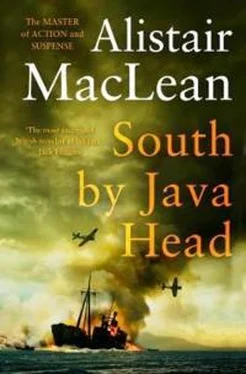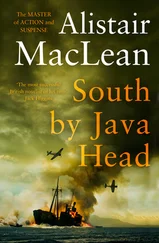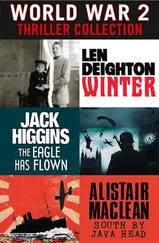From the moment that the first Zero swept in at deck level, shells from its twin cannon smashing into the bridge, until the last torpedo-bomber lifted and banked away from the concussive blast of its own detonating torpedo, only three minutes passed. But they were three minutes that transformed the Viroma from the finest, most modern tanker of the Anglo-Arabian fleet, from twelve thousand tons of flawless steel with all the guns on deck chattering their puny defiance at the incoming enemy, to a battered, blazing, smoke-enshrouded shambles with all the guns fallen silent, the engines gone and nearly all the crew dying or already dead. Massacre, ruthless, inhuman massacre with but one saving grace – the merciless fury of the attack tempered only by its merciful speed.
Massacre, but massacre aimed not at the ship primarily, but at the men who manned the ship. The Japanese, obviously flying under strict orders, had executed these, and brilliantly. They had concentrated their attacks on the engine-room, bridge, fo’c’sle and gun positions, the first of these suffering grievously: two torpedoes and at least a dozen bombs had entered the machinery space and the decks above: half the stern was blown away and in the after part of the ship there were no survivors at all. Of all the gunners, only two survived – Jenkins, an able seaman who had manned a fo’c’sle gun, and Corporal Fraser. Perhaps Corporal Fraser would not be a survivor for long: half his already crippled left arm had been shot away and he was too weak, too shocked, to make more than a token attempt to stem the welling arterial blood.
On the bridge, crouched flat on the floor behind the armoured steel bulkheads of the wheelhouse, half-stunned with the blast and concussion of exploding cannon shells, both Findhorn and Nicolson dimly realised the significance of the plan of attack, the reason for the overwhelming weight of bombers used in the onslaught and the heavy escort of Zero fighters. They realised, too, why the bridge remained miraculously immune from bombs, why no torpedo had as yet smashed into any of the oil cargo tanks – a target impossible to miss – and torn the heart out of the Viroma . The Japanese weren’t trying to destroy the Viroma : they were trying to save the Viroma and to destroy the crew. What matter if they blew the stern off the ship – her nine great oil tanks, still intact, and the fo’c’sle had enough reserve buoyancy to keep the ship afloat: awash, perhaps, but still afloat. And if they could ensure that none of the Viroma ’s crew lived to blow up or scuttle the shattered ship, ten thousand tons of oil would be theirs for the taking: millions of gallons of high grade fuel for their ships and tanks and planes.
And then, quite suddenly, the almost continuous roar and teeth-chattering vibration of bursting bombs and torpedoes were at an end, the off-beat drone of heavy bomber engines faded quickly in the distance and the abrupt, comparative silence was almost as hurting to the ear as the clamour that had just ended.
Wearily Nicolson shook his head to clear it of the shock and sound and smoke and choking dust, levered himself groggily to his hands and knees, caught the handle of the screen door and pulled himself to his feet, then dropped to the deck like a stone as cannon shells whistled evilly through the smashed windows just above his head and exploded against the chartroom bulkhead, filling the wheelhouse with the shocking blast of sound and a lethal storm of splintered steel.
For a few seconds Nicolson remained prone on the deck, face down with his hands over his ears and his cradling forearms protecting his head, half-dazed and cursing himself silently for his precipitate, unthinking folly in rising so quickly to his feet. He should have known better than to imagine for a moment that the entire Japanese assault force would withdraw. It had been inevitable that they would leave some planes behind to take care of any survivor who might move out on deck and try to rob them of their prize – and these planes, Zero fighters, would remain to the limit of their long range tanks.
Slowly, this time, moving with infinite caution, Nicolson rose to his feet again and peered out over the jagged glass in the bottom of the shattered window frame. Puzzled for a moment, he tried to orientate himself and the ship, then realised from the black bar of shadow from the foremast what had happened. A torpedo must have blown off or jammed the rudder, for the Viroma , losing way rapidly in the water until she was now almost stopped, had swung right round through a hundred and eighty degrees and was facing in the direction she had come. And then, almost at the same time, Nicolson saw something else again, something that made the position of the Viroma of no importance at all, something that made a mockery of the vigil of the planes watching and waiting in the sky.
It hadn’t been miscalculation on the part of the bomber pilots, just ignorance. When they had attacked the fo’c’sle, destroying guns and gunners and using armour piercing cannon shells to penetrate the fo’c’sle deck and kill any of the crew members sheltering beneath, it must have been a reasonable supposition to them that that was all they were doing. But what they did not know, what they could have had no means of knowing, was that the storage space beneath the fo’c’sle deck, the tween-deck cargo hold beneath that and the even larger hold beneath that were not empty. They were full, completely, rilled to capacity with hundreds of closely stacked barrels, with tens of thousands of gallons of high-octane aircraft fuel – petrol intended for the shattered, burnt-out wrecks that now littered the Selengar airfield.
The flames rose a hundred, two hundred feet into the still, breathless air, a great, solid column so white, so intensely hot and free from smoke that it was all but invisible in the bright glare of the afternoon sun, not flames really but a broad shimmering band of super-heated air that narrowed as it climbed and ended in a twisting, wavering point that reached far up beyond the tip of the foremast and died in a feathery wisp of pale blue smoke. Every now and then another barrel would explode deep in the hold and, just for a moment, a gout of thick smoke would lace the almost invisible flame and then, as quickly, it would be gone.
And the fire, Nicolson knew, was only starting. When the flames really got hold, when the barrels started bursting by the dozen, the aviation spirit in the for’ard fuel tank, number nine, would go up like an exploding ammunition dump. The heat of the flames already fierce on his forehead, he stared at the fo’c’sle a few moments longer, trying to estimate how much time they had left. But it was impossible to know, impossible even to guess. Perhaps only two minutes, perhaps as long as twenty – after two years of war the toughness of tankers, their reluctance to die, had become almost legendary… But certainly not more than twenty minutes.
Nicolson’s attention was suddenly caught by something moving among the maze of pipes on the deck, just aft of the foremast. It was a man, dressed only in a pair of tattered blue denims, stumbling and falling as he made his way towards a ladder that led up to the catwalk. He seemed dazed and kept rubbing his forearm across his eyes, as if he couldn’t see too well, but he managed to reach the foot of the ladder, drag himself to the top and began, at a lurching run, to make his way along the catwalk to the bridge superstructure. Nicolson could see him clearly now – Able Seaman Jenkins, trainer of the fo’c’sle pom-pom. And someone else had seen him too and Nicolson had time only for a desperate shout of warning before he flung himself to the deck and listened, with clenched fists, to the hammerblows of exploding cannon shells as the Zero pulled out of its short, sudden dive and raked the fore-deck from fo’c’sle to bridge.
Читать дальше
Конец ознакомительного отрывка
Купить книгу










